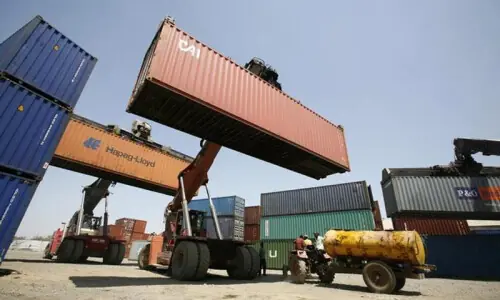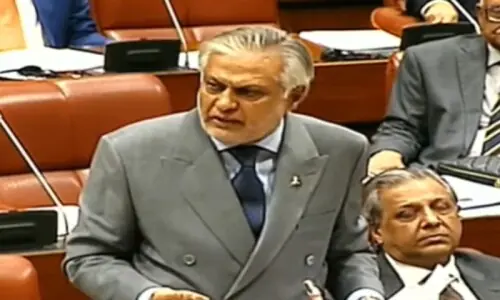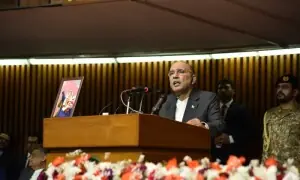IN contrast with the planned secondary public offering of state-owned OGDC — which has left a bad taste in investors’ mouths due to court intervention and falling oil prices — stakeholders have multiple reasons to be hopeful about the capital market transaction involving the country’s fifth largest bank.
The government is on-track to offload its residual holding of about 10pc in Allied Bank Ltd (ABL) in the coming months. Sector watchers are hopeful that the transaction will yield sizable revenue for the government, given that the banking sector has outpaced the broader equity market so far this year.
The ABL stock is up by over 30pc so far this year. “Banking stocks in general are up this year. But our free float is limited. After the government’s divestment, our float would increase, [ultimately] leading to share price appreciation. We will become a truly private bank,” commented ABL CFO Tahir Hassan Qureshi while talking to Dawn over phone.
ABL’s limited free float will increase after the government divests its shareholding in the bank — CFO Tahir Hassan Qureshi
The privatisation commission had set last Tuesday as the deadline for firms to apply for the position of ‘lead manager and book runner’ for the transaction.
The transaction would follow an earlier one involving the United Bank Ltd, where the government pocketed about $387m ($310m of which was in foreign exchange) after offloading 19.8pc of its residual holding in the bank.
Financial performance: Unlike a few of its bigger peers who have seen a slight slowdown in their profitability levels for the first nine months of the year (9MCY14), Allied Bank’s earnings are still cruising high.
The bank posted an after-tax profit of Rs11.56bn for 9MCY14, up 38.7pc from the same period last year. This translated into earnings-per-share of Rs10.09, against last year’s Rs7.29. It declared an interim dividend of Rs1.75 per share (17.5pc), bringing its total payout so far this year to Rs4.25 per share.
On a consolidated basis, the bank and its asset management subsidiary posted cumulative after-tax earnings of Rs11.7bn, a rise of 38.4pc from 9MCY13.
A key feature of ABL’s recent performance has been its aggressive expansion, which has led to the addition of over 110 branches in two years. This, in turn, has significantly helped its deposit mobilisation efforts; total deposits stood at over Rs643.4bn by end-September, against Rs608.4bn at end-2013.
A majority of deposits — over Rs200bn — were in non-remunerative current accounts, up 9.4pc from December. Savings accounts rose 8.6pc to Rs157.6bn, while fixed deposits dropped 8.8pc to Rs174.4bn. The bank recorded core expenses of over Rs28.5bn for 9MCY14, up 20.3pc from 2013.
“Core expenses also include the cost of our term finance certificates and interbank borrowings. But the main contributor is savings accounts. Last year, not only the central bank linked our minimum deposit rate with its own deposit rate — which it then increased by 100 basis points — but also mandated that the rate be paid on average balance, instead of on minimum balance as was the case before,” explained Qureshi.
On the investment side, the bank followed the industry-wide trend of parking sizable liquidity in high-yield Pakistan Investment Bonds. PIB holdings rose significantly to Rs189.64bn, from Rs28.8bn at end-December.
However, this corresponded with a sizable decrease in Treasury bill holdings, which went down from Rs278.2bn to Rs143.6bn. The bank’s net investments clocked in at over Rs371.4bn, up a marginal 5pc from 2013.
When asked if he expected the investment scenario to change in the short- to medium-term, Qureshi replied in the negative, saying it will continue to be driven by the government’s borrowing appetite from the banking system.
Advances: While the bank’s net advances rose around 6pc to reach Rs282.7bn by end-September, its exposure to Byco Petroleum under a syndicated financing arrangement emerged as a problem in the third quarter. The bank classified its exposure to the refinery — to the tune of Rs2.74bn — as non-performing, taking its toxic loans to over Rs23bn, from Rs19.4bn at end-December.
However, the central bank gave a relaxation to the bank in September by allowing it to defer booking the relevant provisions till June 29, 2015. As a result, for 9MCY14, the bank was able to record a reversal of Rs23.4m in provisions against NPLs.
Qureshi shared some concerns when asked about the bank’s lending. “Banks are primarily in the market to lend to customers and businesses. But we also have to take stock of ground realities.”
Meanwhile, the bank’s non-core operations performed quite well in the nine-month period, which was reflected in the 38.7pc yearly rise in income from this segment to over Rs10bn. In particular, the bank recorded a three-fold increase in capital gains to Rs3.4bn, while banking fees and commissions also rose steadily to Rs2.4bn. ABL was the ‘banker to the offer’ when Bestway Cement moved to acquire Lafarge Cement Pakistan for $329m in July.
Meanwhile, non-interest expenses grew almost 10pc to Rs12.7bn in 9MCY14. The bank attributed this to its branch expansion and inflationary pressures.
Published in Dawn, Economic & Business, November 3rd, 2014































